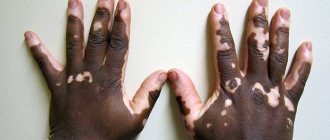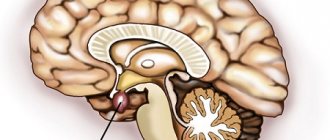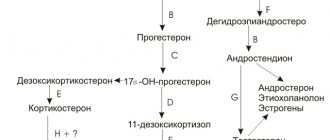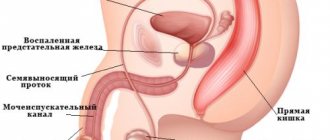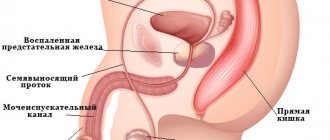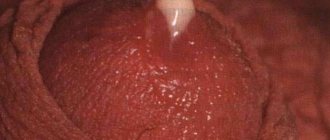According to statistical information, the percentage of infertile couples varies from 10 to 25%, and the man is often “to blame” for the absence of children. There are no external signs and symptoms of infertility in men. Infertility is said to occur when the partner does not become pregnant within 12 months of regular sex without using condoms. Infertility is a reproductive dysfunction that has many causes and provoking factors. Let's consider the main causes and types of pathology.
Types of infertility
According to the Russian Clinical Guidelines for Urology of 2019, depending on the causes of occurrence, male infertility is classified as follows (pathogenetic classification):
- Secretory – testicular dysfunction in terms of sperm production, provoked by congenital or acquired pathologies;
- Excretory – disruption of the transport of sperm from the testicles through the urethra, deterioration of the patency of the seminal ducts;
- Immunological - the body reacts to sperm as foreign agents and produces antisperm antibodies against them;
- Combined – infertility caused by several factors;
- Idiopathic (relative) - the reasons that caused the decrease in sperm fertility cannot be identified: sperm are normal, erectile function is also normal.
Excretory infertility due to blockage of the vas deferens.
Secretory infertility, in turn, is divided into three types:
- Testicular - the reason for poor sperm quality lies directly in the functioning of the testicles and their appendages (impaired spermatogenesis).
- Pretesticular – abnormalities in the functioning of the testicles are caused by hormonal reasons.
- Posttesticular - spermatogenesis is normal, but sperm fertility is reduced due to pathologies of the vas deferens or disorders of the secretion of other glands (prostate, seminal vesicles). The viability of sperm depends on the quality of their secretion.
Depending on the time of occurrence, infertility can be primary (no woman has become pregnant) or secondary (partners have become pregnant). The primary form usually cannot be corrected. Infertility may be accompanied by a number of additional symptoms, the severity of which depends on the cause of the pathology.
Signs and symptoms
Signs of infertility in men are vague. Sexual activity or male constitution do not in any way affect the possibility of conceiving a child. Typically, men diagnosed with infertility do not have symptoms of sexual impotence and have an active sex life. Also, until a certain moment (until they decide to become parents) they do not even suspect that there is a problem. There are no obvious symptoms of male infertility or fertility disorders.
Cloudy urine is a signal to see a doctor
The main sign of male infertility is the absence of pregnancy in a healthy woman with regular sexual activity for 1 year or more.
Table 1 - Signs of male infertility
| Explicit | Indirect |
| · Congenital pathologies that require surgical treatment (varicocele, cryptorchidism). · Cloudy urine, which may occur immediately after sexual intercourse. · Obvious hormonal imbalance (enlarged mammary glands, abnormal development of testicles, etc.). | · Significant reduction in ejaculate volumes. · Decreased potency. · Pain that occurs in the testicles or scrotum. · Accompanying sexual intercourse with painful sensations. |
The genetic and autoimmune forms of pathology have no clinical manifestations.
Causes of infertility
All causes of male infertility are divided into several types depending on the affected organ. Testicular pathologies related directly to the functioning of the testicles include the following pathologies:
- Cryptorchidism - in infancy, the testicle does not descend into the scrotum, sperm are not synthesized in it due to unfavorable temperature conditions. Theoretically, reduction to the scrotum is possible by increasing the supply vessel, but in this case doctors do not give guarantees of the organ’s functionality.
- Torsion of the spermatic cord is an acute condition requiring emergency care. Otherwise, the testicle is deprived of nutrition, ischemia of its tissue develops, followed by death.
- Viral orchitis caused by mumps (“mumps”). Due to severe inflammation, testicular tissue begins to melt, deform and be replaced by connective tissue (spermatozoa are not formed in them). It should be noted that not all men who suffered from mumps in childhood are infertile. The problem is relevant only for those who had untimely management of a testicular complication.
Urologist-andrologist, candidate of medical sciences Alexey Viktorovich Zhivov talks about the causes of male infertility
- Chemo- and radiation therapy. Treatment used for cancer often leads to irreversible infertility due to toxic damage to spermatogenic cells. If a man plans to have children in the future, then before starting therapy, doctors recommend cryopreservation of sperm and storing them in a special bank.
- Inflammatory processes in the pelvic area. The number of leukocytes increases, due to the activity of which sperm are exposed to oxidative stress (reactive oxygen species destroy their shell, damage the DNA chain (fragmentation)).
- Among the testicular causes of male infertility, varicocele is distinguished separately. The pathology occurs quite often (in 40% of cases of male infertility). Blood stagnates in the dilated veins, as a result of which the nutrition of the testicles deteriorates and defective sperm are produced in small quantities.
- Hypergonadotropic hypogonadism is an increased level of gonadotropins (stimulants of the synthesis of male sex hormones) and low testosterone levels due to testicular dysfunction. The pituitary gland and hypothalamus try to trigger the synthesis of androgens, increasing the rate of production of gonadotropins.
- Resistance (stability, immunity) to androgens is a congenital mutation due to which the receptors become insensitive to the effects of male sex hormones; testosterone cannot stimulate the testes to synthesize sperm.
- STD. Some infections penetrate the testicles, attack sperm, and poison spermatogenic cells with the products of their metabolism.
- Reduced hemoglobin. Anemia provokes circulatory failure, including in the testicles.
- Genetic abnormalities (Klinefelter syndrome - karyotype 47XXY, extra female chromosome), deletion (loss of one sector of the Y chromosome). There are two options: absolute infertility (genetic, congenital infertility) due to complete dysfunction of the testicles or the possibility of in vitro fertilization with sperm extracted from the testicle by biopsy.
Endocrinologist-andrologist Daria Aleksandrovna Gusakova talks about how the male disease Klinefelter syndrome manifests itself, is diagnosed and treated.
Posttesticular infertility is usually provoked by a violation of the patency of the seminal ducts. The reason may be inflammatory tissue deformation, the presence of cysts and neoplasms. Posttesticular infertility is also caused by infectious inflammation of the accessory sex glands, the secretion of which is also included in the ejaculate: vesiculitis, prostatitis.
The causes of pretesticular infertility are pathologies of the hypothalamus and pituitary gland (glands in the brain):
- Adenoma.
- Infectious inflammations.
- Secondary hypogonadotropic hypogonadism.
- Hyperprolactinemia (excess of the hormone prolactin).
The cause of immunological (autoimmune) infertility is a violation of the structure of the blood-testis barrier - a layer of cells that protect sperm in the seminiferous tubules from the immune system. Provoking factors: perineal trauma, infections of the reproductive system, genetic pathologies, tumors, varicocele, inguinal hernia.
Low sperm fertility is not always the cause of male infertility. In some cases, sperm simply do not enter the woman’s reproductive tract:
- Erectile disfunction.
- Anejaculatory syndrome.
- Retrograde ejaculation (sperm flows into the bladder).
The mechanism of retrograde ejaculation
The functioning of the testicles can be disrupted by smoking (more than 10 cigarettes per day), alcohol (more than 60 g per day), caffeine (more than 300 g per day), and taking certain medications, including:
- Ketoconazole;
- Sulfasalazine;
- Aspirin, non-steroidal anti-inflammatory drugs;
- Cytostatics.
If, subject to regular sexual activity without the use of contraception, a couple is unable to have a child, then the man should contact an andrologist, urologist or reproductive specialist.
Abnormalities in sperm
The doctor treats infertility based on the cause of its occurrence, but for this it is necessary to do a spermogram.
It will show whether there are spermatogenesis disorders and what measures can be taken to eliminate the problem.
Sperm pathologies:
- Asthenozoospermia is a decrease in the number of active sperm, which leads to the inability to fertilize the egg.
- Azoospermia, i.e. the complete absence of sperm, which can occur due to obstruction of the ducts or when the process of sperm formation is disrupted.
- Oligospermia is the most common. This is a condition where the number of live sperm is reduced to a minimum; there are almost no symptoms of this disease, so a detailed examination is necessary. The cause of this condition may be a disease suffered in childhood. The doctor cannot prescribe treatment; artificial conception or donation is usually used.
- Leukospermia, in which there is an increased content of leukocytes in the sperm, which leads to inflammatory processes in the reproductive organs. In this case, it is necessary to prescribe specific drug treatment.
- Polyspermy is an excess of sperm, but the sperm have low activity. Often treatment is impossible; only artificial insemination is prescribed.
- Aspermia is a complete absence of sperm and is a consequence of mental disorders.
- Teratozoospermia, i.e. the presence of a large number of pathological sperm.
Diagnostics
The task of diagnosis is to confirm the fact of infertility and find out its causes. At the first consultation, the doctor talks with the patient, collects anamnesis, and conducts a physical examination (external examination, palpation of the testicles). On the same day, you can donate sperm for general and biochemical analysis (preliminary preparation is required).
Read about the rules for taking a spermogram.
Spermogram
The doctor's further actions depend on the results of the spermogram. The absence of deviations is designated by the term “normospermia”; in the presence of pathologies, various types of pathospermia are diagnosed:
- Akinozoospermia is the absence of motile sperm.
- Cryptozoospermia - sperm are found only in the semen sediment after centrifugation.
- Teratozoospermia – many sperm with disturbed structure (morphology). To identify pathology, it is necessary to take an extended spermogram with Kruger morphology assessment. There should be more than 4% normal sperm. The analysis costs about 2000 rubles.
- Oligospermia – little seminal fluid (less than 2 ml).
- Azoospermia is the absence of sperm in the seminal fluid. It can be secretory (testes do not produce sperm) or obstructive (sperm cannot pass through the vas deferens).
- Oligozoospermia is a reduced concentration of sperm in 1 ml of ejaculate (the norm is more than 15 million).
- Oligoasthenozoospermia is an insufficient number of sperm and their progressively motile forms.
- Oligoasthenoteratozoospermia – three indicators are below the standard: the total number of sperm, their progressively mobile and morphologically normal forms.
- Necrozoospermia - few living and many immobile sperm.
- Leukospermia is an increased number of leukocytes in semen (a sign of inflammation).
Spermogram with deviations (normozoospermia with aggregation)
If deviations are detected, the spermogram is taken again . This is necessary for an objective assessment, since indicators are constantly changing and depend on a large number of external and internal factors (food, stress, physical activity, overheating).
To identify the cause of pathospermia, ultrasound of the pelvic organs, culture of sperm and prostate juice are prescribed. To exclude retrograde ejaculation, post-ejaculatory urine analysis is prescribed. To determine endocrine infertility, blood is examined for hormones (hormonal profile): LH, FSH, testosterone. The patency of the seminal ducts and the condition of the seminal vesicles are checked using genitography (a series of x-rays after the administration of a contrast agent).
Additional tests for idiopathic infertility
Often, infertility (this also includes miscarriages and missed pregnancies) is diagnosed with a completely normal spermogram. To find out the reason, additional studies are prescribed:
- MAR test - analysis of spermatozoa for the presence of antisperm antibodies (price from 1200 rubles).
- Analysis for sperm DNA fragmentation (TUNEL method from RUB 8,300).
- Karyotype study (especially relevant for azoospermia, oligozoospermia) - cytogenetic analysis to identify the risks of Down syndrome, Kleiefelter syndrome and other chromosomal abnormalities. The norm is 46XY, price from 4900 rubles.
Urologist Kamaletdinov Rinaz Enesovich clearly talks about the diagnosis and treatment of male infertility
- Study of the body's antioxidant activity - antioxidant status (are there enough antioxidants in the blood, is sperm able to resist reactive oxygen species that damage sperm). Price from 2450 rub. Assessment of sperm oxidative stress (ROS). Price from 2000 rub.
- Acrosin test (assessment of acrosomal reaction) - tests sperm for the ability to penetrate an egg. In the head of the male gamete there is a special vial with enzymes (acrosome), which dissolve the membrane of the female cell upon contact. Price from 3000 rub.
- EMIS is a microscopic examination of the internal structure of sperm. Price from 9000 rub.
- NVA – determination of the degree of sperm maturity. Price from 5000 rub.
Some clinics offer a comprehensive examination that includes the above types of tests. It's called, the price starts from 18,000 rubles. During promotions you can save up to 25-30%.
The general diagram of diagnostic measures is presented below:
Diagnosis of male infertility
A testicular biopsy is performed if there are no sperm in the ejaculate. If they are present in the seminiferous tubules, then the causes of infertility are obstruction of the spermatic ducts; if they are absent, then you can either try to stimulate spermatogenesis or use donor sperm.
Male reproductive system
To fertilize a woman, the organs that are responsible for this need to function properly. The main goal of the reproductive system is the production of full-fledged germ cells. The sperm carries hereditary information.
Genetic data is concentrated in its head. The tail moves the sperm towards the egg.
The process of spermatogenesis (development of germ cells) occurs in the testicles. The sperm matures as it moves through the tubules. Their length is more than 500 meters. The convoluted tubules gradually end in a straight segment and flow into the seminiferous appendage. There the formation of a full-fledged reproductive cell is completed.
The sperm ready for fertilization moves into the seminal vesicles. They produce a secretion that nourishes the germ cells. Sperm is obtained at the final stage. During ejaculation, prostate secretion is added to the seminal fluid.
Treatment
In case of infertility, before choosing a method of artificial insemination, doctors try to maximize the quality of sperm (if any). The patient is recommended to adjust their lifestyle: move more, eat rationally, eliminate bad habits, lose excess weight (waist circumference should be no more than 94 cm). To improve sperm quality, antioxidant therapy is especially effective:
- Vitamins C, E, A, D;
- L-carnitine, L-arginine;
- Coenzyme Q10;
- Folic acid;
- Zinc, selenium.
Preparations for antioxidant therapy
For the treatment of mild forms of infertility, as well as to restore the functions of the glands after surgical operations on the reproductive organs, complex drugs are prescribed: Speman, Spermaktin, Tribestan, Profertil, Gerimaks Premium. The course of treatment lasts at least three months - the period for the renewal of a full set of sperm. Only after three months does it make sense to draw conclusions about the effectiveness of therapy.
Doctors are positive about some traditional methods of treating idiopathic infertility:
- Beekeeping products (death, beebread, drone homogenate). They take first place in efficiency due to a rich set of biostimulating substances, hormones, vitamins and microelements.
- Herbs (hogweed, sage, St. John's wort).
- Mumiyo, beaver stream.
For many patients with various forms of infertility, doctors recommend treatment in sanatoriums:
- “Beshtau”, “Mashuk Aqua-therm” (Zheleznovodsk);
- "Talaya" (Magadan region);
- All-Union Central Council of Trade Unions (Nizhny Novgorod);
- “Staraya Russa” (V. Novgorod);
- Sanatoriums in Saki (Crimea).
Programs include drinking mineral water, baths, mud treatments, climate therapy (walks through coniferous forests and mountains), microenemas with mineral water, prostate drainage, and physiotherapy.
Treatment methods for certain types of infertility:
- Hypogonadotropic hypogonadism: human chorionic gonadotropin (stimulator of testosterone production), menotropins. Testosterone replacement therapy is not recommended (they suppress the synthesis of LH and FSH).
- Varicocele, obstruction of the seminal ducts. In the first case, the Marmara operation is performed (price from 55 thousand rubles). Impaired patency is corrected by surgical methods (vasovasostomy, tubulovasostomy, transurethral resection). If the operation is successful, sperm production is restored within 3-18 months.
Urologist-andrologist Nikolai Konstantinovich Solovyov talks about the technique of performing the Marmara operation for varicocele
- Infectious lesions of the reproductive organs: broad-spectrum antibiotics. For the treatment of chronic prostatitis, Longidaza, Vitaprost, and Prostatilen are used (more information about the treatment of prostatitis).
- Severe forms of pathospermia: assisted reproductive technologies.
- Lack of sperm: donor sperm.
For erectile dysfunction, PDE-5 inhibitors and alprostadil injections are prescribed.
ART – assisted reproductive technologies
If the sperm have a normal structure, but are inactive or there are few of them, then insemination is used - the introduction of pre-selected male gametes directly into the uterus. If a man has been diagnosed with uncorrectable infertility, the doctor gives a referral for IVF - artificial insemination. The simplest option is to inject sperm into a test tube that already contains pre-extracted eggs. After fertilization, the embryos are placed in the uterus. The full cycle of manipulations from hormonal stimulation to embryo transfer is called a protocol. The price starts from 130 thousand rubles. A repeated protocol if the first one fails will cost less – from 99 thousand rubles.
Theoretically, a woman can become pregnant even with severe forms of male infertility. Even if he has only a few units of suitable sperm, modern technologies make it possible to find them directly in the testicle (TESE, TESA, MESA methods), extract them and use them for fertilization. The sperm is artificially implanted through the membrane of the egg (ICSI, PIXI method), then all that remains is to wait for the process of cell division and the formation of an embryo. ICSI price from 83 thousand rubles.
Assisted reproductive technologies
However, in practice everything is not so optimistic. Many protocols end in failure (IVF efficiency is only 40%), and the clinic does not return the money. Doctors who give a referral for IVF under compulsory medical insurance more objectively assess a couple’s chances of success with male factor infertility. On a paid basis, private clinics accept everyone on the principle of “any whim for your money.”
There are many positive reviews on thematic forums about the following medical institutions:
- Clinic “Mama” (Moscow) is the most popular, the best embryologists;
- Institute "Remedy" (Moscow);
- Clinic “Mother and Child” (various cities);
- ICLINIC (various cities);
- (St. Petersburg).
Criteria that you should focus on when choosing: the presence of your own cryogenic storage facility, the professionalism of embryologists, the percentage of successful pregnancies.
Assisted reproductive technologies
If treatment of infertility with conservative or surgical methods does not give the desired result, the doctor will recommend alternative methods. These include:
- Artificial insemination. During the procedure, sperm that was previously collected from the man is injected into the woman's cervical canal or uterus. If there are very few or no active sperm in the ejaculate, then donor biological material can be used. This method is used for sterility with unknown etiology or autoimmune infertility.
- IVF for male factor infertility. In this case, fertilization of the female egg occurs outside the body. The procedure involves the selection of eggs from the ovaries after preliminary hormonal stimulation of the woman. Next, it is fertilized in a Petri dish with the man’s sperm. After a few days, the specialist selects the most viable fertilized eggs and transfers them into the uterine cavity.
- Intracytoplasmic sperm injection (ICSI) is the introduction of sperm directly into the egg through microsurgical manipulation. In this case, just one high-quality sperm is enough, which can be obtained through masturbation or surgical aspiration.
- Surrogacy. If none of the listed methods of achieving pregnancy is possible, the couple can resort to the services of a surrogate mother. In this case, a zygote is formed from the reproductive cells of the partners, which is transferred into the uterine cavity of the surrogate mother.
Prevention
Methods for preventing male infertility:
- Healthy lifestyle: moderate regular physical activity, balanced diet (nuts, berries, fruits, greens are required).
- Regular sex so that sperm do not have time to oxidize.
- Timely treatment of STDs.
Do not overheat the groin area often and wear tight underwear. To avoid infertility, you should give up bad habits, of which smoking and drug use are the most destructive for sperm.
Psychological therapy
When standard treatment methods do not help the patient, very often couples resort to alternative methods of therapy. These include reproductive technologies (artificial insemination, insemination, etc.)
It should be noted that successful treatment of infertility involves examination of both the wife and husband. Timely diagnosis of the body contributes to early fatherhood. Therefore, in any case, you need to contact the clinic so that specialists can prescribe the necessary course of treatment.
After a doctor diagnoses a man with infertility, a crisis may occur in family relationships. Even temporary difficulties can often lead to deterioration in relationships, depression and quarrels. In this case, psychological help is often needed by both partners. Many couples doubt whether male infertility can be cured at all. Sometimes, in order to achieve a fulfilling sexual relationship, it is enough to change a woman’s reaction to her partner’s sexual failure.
Can it be treated without surgery?
Infertility is treated with medication in the following cases:
- If it is impossible to perform surgery for a cancerous tumor.
- With endocrine etiology of infertility.
- If the cause is an infection.
- When infertility is caused by a non-infectious inflammatory reaction.
- If the pathology is of a mental nature.
- When infertility is caused by a lack of vitamins or minerals.
In all these cases, surgery is not prescribed. However, if other factors are the cause and surgery is still required, then the procedure cannot be abandoned. This will aggravate the situation; delay can lead to complete infertility.
Infertility has many causes. Medicine can help realize the desire to become a father. Therapy and prognosis of the disease depend on the etiological factor, so special attention should be paid to the diagnosis of pathology. To do this, you need to contact an andrologist, preferably in large medical centers with modern equipment. If surgery is prescribed for treatment, you should not avoid it; in many cases, surgery is an important stage in eliminating infertility.
Causes from the prostate gland and seminal vesicles
Chronic prostatitis often causes infertility in men. In this case, the number of sperm in the seminal fluid decreases, as well as their slowdown. The longer a man does not pay attention to the pathology, the higher the appearance of morphological defects. Due to intoxication, the biological activity of the ejaculate changes. And a long-term inflammatory process contributes to the appearance of scars inside the vas deferens.
Another factor that provokes infertility is vesiculitis, an inflammation of the seminal vesicles that occurs as a result of their infection. These organs serve to produce seminal fluid, which ensures the vital activity of sperm. The inflammatory process disrupts this function, so the biological material quickly dies. To determine the presenting disease, a semen analysis is taken from a man.
How to treat after mumps
All children should receive routine mumps vaccination. If the disease has already occurred, the only method of therapy is to eliminate the symptoms (antipyretics and analgesics are indicated). There is no specific antiviral drug for the treatment of mumps yet.
Infertility is usually diagnosed many years after the illness. To treat adult men and adolescents, surgery is used to remove damaged areas of the testicle. Hormonal drugs are used to accelerate the regeneration of spermatogonia. Such measures after a long period of inactivity rarely give a positive result, so it is better to start treatment in adolescence.
Treatment of male infertility with folk remedies
Herbal decoctions and infusions of healing and medicinal plants, which are a rich source of vitamins, also provide invaluable assistance for treatment.
- Decoction of plantain seeds - one tbsp. Pour a spoonful of seeds into a glass of water and boil for five minutes over low heat. Leave and strain. Drink two tablespoons of infusion. spoons warm four times a day. Recommended for immobile sperm.
- Baths – 50 gr. Pour plantain into one liter of boiling water and leave for forty minutes. After straining, pour the infusion into the bath. Take therapeutic baths every season for fifteen days.
- Syrup made from dark pink and red rose petals. This flower is rich in vitamin E and perfectly stimulates the ovaries and improves male spermatogenesis. Oil, syrups, and water are prepared from the petals.
- Shilajit - take 0.2-0.3 grams orally along with carrot or blueberry juice twice a day on an empty stomach to improve the quality of the semen. The course is from 25 to 28 days. You can mix mumiyo with egg yolk to enhance sexual function.
- Bird's knotweed - brew 1 tbsp. herbs with one liter of boiling water. Drink anytime instead of tea.
- Collection of herbs - mix fifty grams of chamomile, calendula, sweet clover and centaury herbs, coltsfoot. Brew two tablespoons of the collection with two glasses of boiling water and leave for two hours. The decoction is taken six times a day before meals, 1/3 cup. The course is from one to two months.
Currently, modern medicine has great potential for treating male infertility. With timely consultation with a specialist and proper therapy, treatment gives a positive result.
According to the latest statistics, every fourth man is capable of conceiving a child after long but fruitful treatment. The effectiveness in the treatment of male infertility is 15% higher than the success in the treatment of female infertility.
What it is
The standard classification includes 3 types of infertility:
- Inability to pass sperm. The reason may lie in damage to the vas deferens, disruption of its integrity, as well as blockage of connective tissue. Adhesions appear due to inflammation, injury, and congestion.
- Pathology of spermatogenesis. Occurs for endocrine, vascular, anatomical reasons. As a result, the number and proportion of active and healthy sperm decreases. Cells appear with a disturbed structure and shape, inactive or even dead.
- Autoimmune cause . The difference is that the sperm are completely healthy, but they are destroyed by the body's own immune cells in the ejaculate. As a result of the attack by antibodies, sperm become inactive or die.
Which doctor should I contact?
Urologists and andrologists specialize in infertility in the stronger sex. Since the disease develops due to the influence of many factors, treatment is always combined. To correctly prescribe therapy, it is necessary to undergo a comprehensive and most in-depth diagnosis.
Diagnostic measures include a large list of tests, medical manipulations and procedures. This is due to the fact that it is very difficult to find the cause, and in some cases, it is not at all possible. Therefore, consultation with a neurologist, surgeon, therapist, endocrinologist and other highly specialized doctors is required. If genetic abnormalities are detected, a visit to a geneticist is required.
If you have problems conceiving a child, you should first visit a urologist/andrologist. Doctors treat infertility, recommend diagnostics, and provide referrals to other medical specialists. If these doctors are not available in the clinic, then they visit a therapist - he will give a referral to another center where there is a urologist or andrologist.
Male infertility is not only a medical problem, but also a social one. The prognosis is determined by the causes and etiological factors, the duration of the disease, the success of drug and surgical treatment, etc. According to statistics, approximately 40% of infertile couples become parents within several years after therapy.
Male infertility is a violation of reproductive function, the inability to conceive offspring. The cause of the pathology is a change in the quantity and quality of sperm. This condition has several types. It is important to know the symptoms of infertility. If they appear, consult a doctor and begin treatment.

